| Srl | Item |
| 1 |
ID:
138618
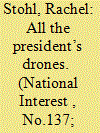

|
|
|
|
|
| Summary/Abstract |
WHEN THE Senate Select Committee on Intelligence released its “torture report” in December 2014, it reignited the battle over the George W. Bush administration’s conduct of the “war on terror.” Unfortunately, the interrogation program was not an anomaly in its lack of transparency. A similar problem exists with the U.S. drone program—which, after more than ten years of use and nearly two years after President Barack Obama’s speech promising greater transparency and accountability, remains shrouded in secrecy and uncertainty.
|
|
|
|
|
|
|
|
|
|
|
|
|
|
|
|
| 2 |
ID:
085518
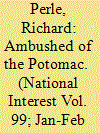

|
|
|
|
|
| Publication |
2009.
|
| Summary/Abstract |
One of America's best known neoconservatives gives his take on what went over the past eight years, the role of the state Department in hijacking Bush's foreign policy and why 50 million conspiracy theorists have it wrong
|
|
|
|
|
|
|
|
|
|
|
|
|
|
|
|
| 3 |
ID:
118634
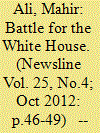

|
|
|
| 4 |
ID:
172688
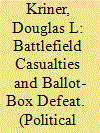

|
|
|
|
|
| Summary/Abstract |
In the 2016 election, foreign policy may have played a critically important role in swinging an important constituency to Donald Trump: voters in high-casualty communities that had abandoned Republican candidates in the mid-2000s. Trump’s iconoclastic campaign rhetoric promised a foreign policy that would simultaneously be more muscular and restrained. He promised to rebuild and refocus the military while avoiding the “stupid wars” and costly entanglements of his predecessors. At both the state and county levels, we find significant and substantively meaningful relationships between local casualty rates and support for Trump. Trump made significant electoral gains among constituencies that were exhausted and politically alienated by 18 years of fighting. Trump’s foreign policy shows a president beset by competing militaristic and isolationist impulses. Our results suggest that giving into the former may come at a significant electoral cost.
|
|
|
|
|
|
|
|
|
|
|
|
|
|
|
|
| 5 |
ID:
149362


|
|
|
|
|
| Summary/Abstract |
Winthrop University capitalized upon South Carolina’s early presidential primary to bring 10 US Presidential candidates to campus between August 2015 and February 2016. These events are part of Winthrop University’s intentional commitment to civic engagement. This essay describes and analyzes how Winthrop University developed a campus-wide protocol for hosting visits by public officials and candidates. It also provides best practices that campuses may emulate in future election cycles.
|
|
|
|
|
|
|
|
|
|
|
|
|
|
|
|
| 6 |
ID:
155661
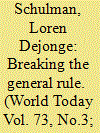

|
|
|
| 7 |
ID:
123840
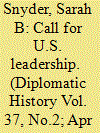

|
|
|
|
|
| Publication |
2013.
|
| Summary/Abstract |
Before Representative Donald Fraser and the House Foreign Affairs Subcommittee on International Organizations and Social Movements held hearings in 1973 on human rights, the issue had garnered only episodic attention by governmental actors. The subcommittee's resulting report called for "U.S. leadership" on the international protection of human rights, and subsequent legislation implemented many of the subcommittee's recommendations. Taken together, the hearings and their consequences signaled a turning point in U.S. human rights policy as they influenced efforts to reshape the State Department's bureaucracy and formalized attention to human rights as a factor in U.S. policy in the years that followed. Importantly, this congressional activism pre-dated Jimmy Carter's administration and ensured attention to human rights would continue beyond his single term in the White House.
|
|
|
|
|
|
|
|
|
|
|
|
|
|
|
|
| 8 |
ID:
108888
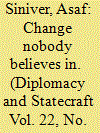

|
|
|
|
|
| Publication |
2011.
|
| Summary/Abstract |
Despite the promise of 'change' in President Barack Obama's early dealings with the Israeli-Palestinian conflict, the policy that has since emanated from the White House was in fact commensurate with those of preceding administrations. Rather than heralding a new direction for American engagement with the conflict, the Obama Administration had displayed more patterns of continuity than change in its dealings with both parties. Specifically, by continuing to act as "Israel's attorney" during negotiations, the Obama team had in effect negated the president's early pledges to act as an honest broker in the conflict. In assessing the (in)effectiveness of the Administration's management of the Israeli-Palestinian issue, it seems that on-going mediation efforts to revive the moribund peace process have exhausted their potential. Arbitration may be explored as a more effective method to resolve the Israeli-Palestinian territorial dispute.
|
|
|
|
|
|
|
|
|
|
|
|
|
|
|
|
| 9 |
ID:
027805
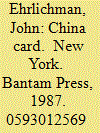

|
|
|
|
|
| Publication |
New York, Bantam Press, 1987.
|
| Description |
523p.Hbk
|
| Standard Number |
0593012569
|
|
|
|
|
|
|
|
|
|
|
|
Copies: C:1/I:0,R:0,Q:0
Circulation
| Accession# | Call# | Current Location | Status | Policy | Location |
| 027365 | 813.54/EHR 027365 | Main | On Shelf | General | |
|
|
|
|
| 10 |
ID:
150289
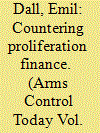

|
|
|
|
|
| Summary/Abstract |
When he departs the White House on January 20, President Barack Obama will leave behind for his successor Donald Trump a portfolio of proliferation challenges requiring early attention.
|
|
|
|
|
|
|
|
|
|
|
|
|
|
|
|
| 11 |
ID:
031937
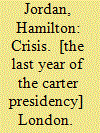

|
|
|
|
|
| Publication |
London, Michael Joseph, 1982.
|
| Description |
431p.Hbk
|
| Standard Number |
0718122488
|
|
|
|
|
|
|
|
|
|
|
|
Copies: C:1/I:0,R:0,Q:0
Circulation
| Accession# | Call# | Current Location | Status | Policy | Location |
| 022262 | 923.10973/JOR 022262 | Main | On Shelf | General | |
|
|
|
|
| 12 |
ID:
095980
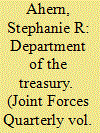

|
|
|
| 13 |
ID:
111974
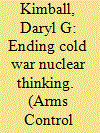

|
|
|
| 14 |
ID:
143749
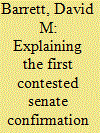

|
|
|
|
|
| Summary/Abstract |
This article explores the first nomination for Director of Central Intelligence (DCI) that was seriously contested in the US Senate. Unlike three previous DCIs who headed the Central Intelligence Agency, John A. McCone faced harsh criticism from some in the news media and 12 negative votes in the US Senate after he was nominated for the position by President John F. Kennedy. The article considers factors, including McCone's personal attributes and recent years' controversies about the CIA, as reasons that provoked some opposition to his confirmation as DCI.
|
|
|
|
|
|
|
|
|
|
|
|
|
|
|
|
| 15 |
ID:
095874


|
|
|
| 16 |
ID:
123436
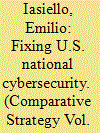

|
|
|
|
|
| Publication |
2013.
|
| Summary/Abstract |
In 2011, the White House and the Department of Defense released strategies for how the United States will approach cyberspace both from an offensive and defensive perspective. Cybersecurity has long been America's Achilles' heel where public and private networks are consistently exploited by criminals, hacktivists, and espionage actors stealing financial data, intellectual property, and sensitive information. The U.S. government has failed to instill an effective national-level cybersecurity apparatus. In order to better position itself defensively, the U.S. government needs to reposition its federal agencies to better capitalize on their capabilities and authorities to address this twenty-first century threat.
|
|
|
|
|
|
|
|
|
|
|
|
|
|
|
|
| 17 |
ID:
127177
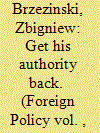

|
|
|
| 18 |
ID:
127120
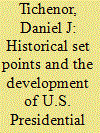

|
|
|
|
|
| Publication |
2013.
|
| Summary/Abstract |
The recent outpouring of work on executive power during emergencies, inspired by the post-9/11 era, has significantly enhanced our legal and theoretical understanding of this crucial subject. A key flaw in this literature, however, is that it is historically un-rooted, either dismissing or ignoring important analytical and empirical insights from presidential research and from APD and historical-institutionalist perspectives. In this article, I argue that we can better explain patterns and variations in the use of presidential emergency power by paying careful attention to shifting historical set points for executive choice and action during security crises. In particular, the findings here underscore the episodic growth of new precedents, resources, and expectations for the White House in perilous contexts. The development of presidential emergency power reflects the potential for early executive choices to be repeated and legitimated over time, laying dormant as a "loaded weapon" to be used by future executives in similarly urgent circumstances.
|
|
|
|
|
|
|
|
|
|
|
|
|
|
|
|
| 19 |
ID:
098665
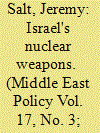

|
|
|
| 20 |
ID:
098711
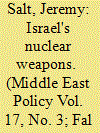

|
|
|